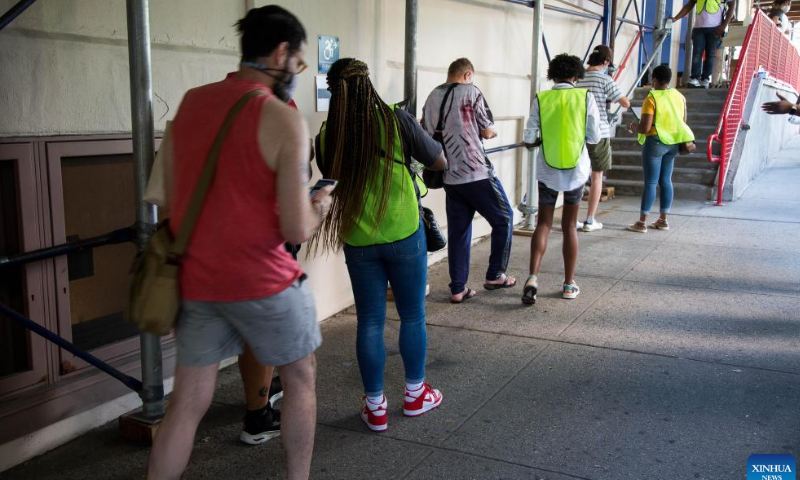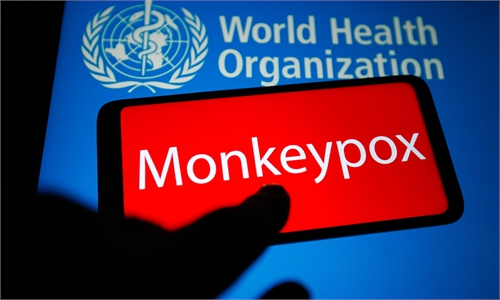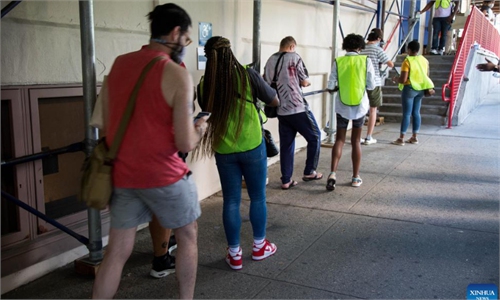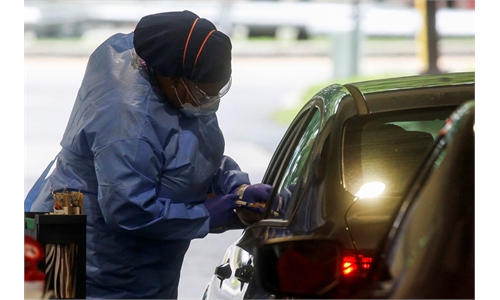
People wait in line at a monkeypox vaccination site in the Brooklyn borough of New York, the United States, on July 30, 2022. New York Governor Kathy Hochul declared a state disaster emergency late Friday night due to the growing monkeypox cases in the state. Photo: Xinhua
US cities and states have begun to declare states of emergency amid rising monkeypox infections, with Chinese and US public health experts warning of risk of rapid spread of the new virus, as the US system appears to be failing yet again to contain the virus.
The country had reported more than 6,000 cases as of Wednesday, but experts said the real number could be several times higher.
California was the latest state to declare a state of emergency on Monday US local time after it reported more than 800 cases, joining Illinois, which made the move on the same day after detecting 500 cases.
The state of New York entered a state of emergency earlier on Friday. Two metropolises - New York City and San Francisco - have also declared health emergencies over monkeypox.
As of Wednesday, 48 of the 50 US states had reported monkeypox infections, according to the US Centers for Disease Control and Prevention (CDC).
Considering the US' leading public health system, the country is expected to react to the outbreaks effectively - or at least in a better way. However, to the disappointment of US medical insiders and the media, the superpower failed yet again, in the way it did in responding to the COVID-19 pandemic.
"Our country's response to monkeypox has been plagued by the same shortcomings we had with COVID-19," wrote Scott Gottlieb, former commissioner of the US Food and Drug Administration, in the New York Times on Saturday. He said that the US failed to get it under control due to "an absence of coordination among federal agencies," and "poor planning, lack of urgency and clumsy execution."
Chinese health experts also noted that the monkeypox outbreak once again exposed the US public health system's limited capacity, although it's dubbed as the strongest public health system in the world.
"Because US states are more administratively independent, it is difficult for the CDC to coordinate, to aggregate even basic data and to mobilize resources," Zhuang Shilihe, a Guangzhou-based medical expert, told the Global Times on Wednesday, noting that the US' overemphasis on the value of individual freedom also has a negative impact on disease control.
"COVID-19 has crowded out too many medical resources in the past two years, and the control of other diseases has been weakened," Zhuang said. "The healthcare system and the public have also become tired."
All these issues are pushing the hardest-hit community to the edge, he said.
"It unfortunately seems that despite two years of building up our public health infrastructure to prevent what happened with COVID-19 from ever happening again, despite the fact that we are better prepared in terms of already having a vaccine available, the CDC and FDA seem to be caught flat-footed once again," said Dr. Stacy Lane, founder of the LGBTQ-centered Central Outreach Wellness Center in Pittsburgh, as quoted by CNN.
More than 6,000 infections have been reported in the US so far, but the number may actually be far higher, Zhuang said.
"Because the disease is now heavily stigmatized, many people avoid testing or refuse to admit infection," he said. "It also has a long incubation period. It's very likely that a large number of infected people are not yet showing symptoms and are continuing to spread the virus."
An estimate from the Institute for Health Metrics, a research center at the University of Washington, suggests that actual infection numbers in the first week of July were about seven times higher than reported cases, which have averaged about 107,000 each day over the past two weeks, according to data from Johns Hopkins University.
Many other parts of the world, like the US, are reporting soaring monkeypox infections. As of Wednesday, 25,391 cases had been reported around the world, of which 25,047 were found in countries that have not historically reported monkeypox, according to the US CDC.
Although the number of monkeypox cases is on the rise, immunologists told the Global Times that the general public still does not have to worry too much about an out-of-control spread, like COVID-19 did two years ago.
"At this point, the data show that the spread of monkeypox remains primarily among men who have sex with men, and there has not been a noteworthy expansion of the infected population," Zhuang told the Global Times. "The current situation remains what the medical community expected."
On May 30, the WHO said that the monkeypox outbreak was unlikely to lead to a pandemic, but added that it was too soon to completely rule out the possibility.
On July 23, the WHO declared the ongoing monkeypox a Public Health Emergency of International Concern (PHEIC). The only other two current PHEIC declarations involve COVID-19 and poliomyelitis.
The "immunity debt" owed in the past two years may lead to a breakout of epidemics now and in the near future, Zhuang warned.
"Countries have adopted policies of social distancing, which reduced the risk of the transmission of many infectious diseases, including COVID-19," he said.
"Now with the reopening of many parts of the world, these infectious diseases are bound to sweep in again," he said.



